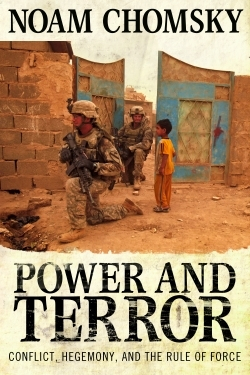Power and Terror
Like it or not, Noam Chomsky is America’s conscience. His indignant voice cuts through all the official “patriotic” babble to lay bare actual causes and effects in this country’s political policies, both foreign and domestic. It should be pointed out, though, that Chomsky does not see America as being singularly villainous on the world stage. America just happens to be the current big power player whose actions he can examine close at hand. Getting and maintaining power, he would argue, has always brought out the worst in any nation. The greater the power, the more terror it is likely to spread—although the terrorizing country will tend to use such gentler terms as “Christianizing,” “civilizing,” or “liberating.”
This book is a revised and updated edition of Power and Terror: Post 9/11 Talks and Interviews, first published in 2002 in response to the terrorist attacks on the World Trade Center, the Pentagon, and America’s psyche. Recalling that omnibus event, Chomsky told an interviewer that it was “[a] terrible atrocity, but unless you’re in Europe or the United States or Japan, I guess, you know it’s nothing new. That’s the way imperial powers have treated the rest of the world for hundreds of years… . I’m sitting here [at the Massachusetts Institute of Technology] because some religious fundamentalist fanatics from England came over here and started exterminating the local population… .” Obviously, such plain-spokenness does not go down well with government officials or with the media that subsists on official handouts. One needs only to look back at the media’s generally gung-ho response to America’s invasion of Iraq to see how this poisonous co-dependency operates.
In this volume, Chomsky lays out his critiques through a series of speeches, interviews, and question-and-answer sessions that took place in 2002, 2008, and 2010. While his focus is mainly on America’s depredations in Iraq, Afghanistan, Latin America, Vietnam, and the Israeli-occupied territories, his examples of the excesses of power are wide-ranging, from Germany’s systematic purges of the Jews and other “undesirables” to Turkey’s persecution of the Kurds to Japan’s support of Indonesia’s occupation of East Timor.
National power is always a manifestation of economic forces, and one wishes Chomsky had paid more attention in his analyses to how the flow of capital reinforces or shifts the balance of power. He does touch on this matter, but only lightly, when he speaks of globalization. Still, this is an immensely valuable resource for Americans who look abroad and honestly wonder, “Why don’t they like us?”
Reviewed by
Edward Morris
Disclosure: This article is not an endorsement, but a review. The publisher of this book provided free copies of the book to have their book reviewed by a professional reviewer. No fee was paid by the publisher for this review. Foreword Reviews only recommends books that we love. Foreword Magazine, Inc. is disclosing this in accordance with the Federal Trade Commission’s 16 CFR, Part 255.

